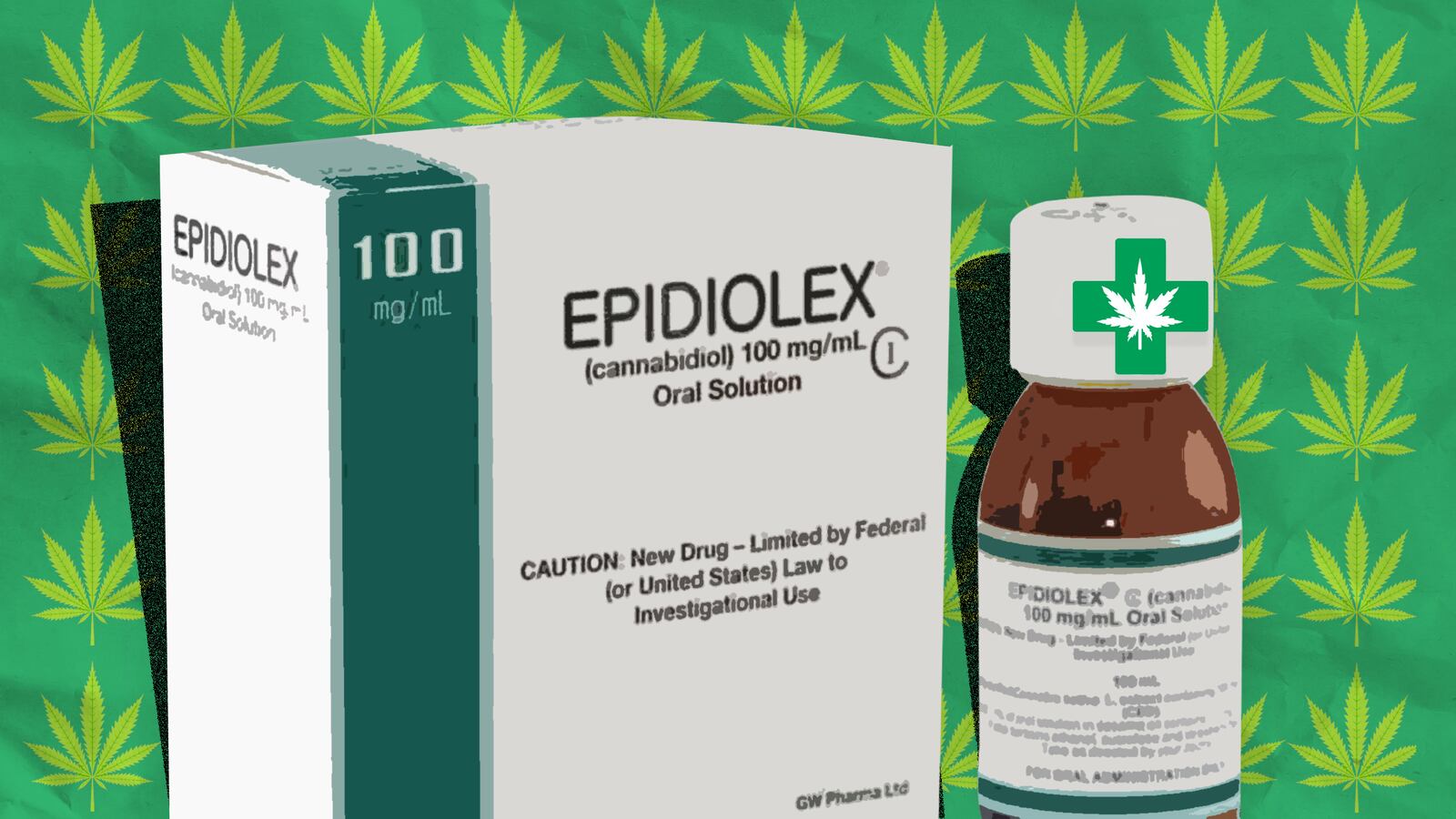On Monday, the U.S. Food and Drug Administration made a surprising announcement: The agency had recommended for approval the first marijuana-based drug, called Epidiolex, to treat two types of severe epilepsy.
Epidiolex is an oil containing cannabidiol (CBD)— a component of cannabis that does not cause the psychoactive high typically associated with marijuana. The drug was formally approved to treat Lennox-Gastaut syndrome and Dravet syndrome, which are particularly rare. Both cause daily seizures, are associated with developmental delays, and often don’t respond to standard anti-seizure medications. In three randomized, controlled trials, which included over 500 patients with one of the two syndromes, Epidiolex reduced seizure frequency compared to placebo when it was added on to patient’s normal treatment regimens.
Like all components of marijuana, CBD is still classified as a Schedule I drug by the Drug Enforcement Administration, meaning that it’s considered by that agency to have no medical use. Possession is federally illegal, and its legal status in many states is murky. Epidiolex can’t be marketed to patients until that designation is changed, and since the FDA has signaled the compound does, in fact, have a medical use, that’s expected to happen.
GW Pharmaceuticals, which developed the drug, said in a press release that it expects the compound to be rescheduled by the DEA within 90 days. It’s not clear, though, what CBD’s new classification will be changed to.
FDA Commissioner Scott Gottlieb stressed in a statement from the FDA that the decision isn’t an approval of the medical use of marijuana overall. “This is the approval of one specific CBD medication for a specific use,” he said in the statement.
Once the drug hits pharmacy shelves (and assuming CBD is removed from the list of Schedule I drugs), patients with Lennox-Gastaut syndrome and Dravet syndrome won’t be the only ones to benefit. Epidiolex will presumably be prescribed for other forms of epilepsy, experts say—and potentially other disorders, as well.
Perhaps most importantly, the anticipated rescheduling of CBD will make it easier for researchers to study its efficacy for other illnesses.
Right now, though, scientists are hoping to study the effects of CBD on any number of medical conditions have to jump through dozens of hoops with the FDA, the DEA and the National Institute on Drug Abuse, which slows progress and makes it hard to build sustained research momentum. But the studies that do exist are promising: They hint that CBD has anti-inflammatory properties and helps ease anxiety. It’s also a potential therapeutic target for opioid use disorder and addition.
The expected rescheduling of CBD will make it easier to iron out the questions still remaining on efficacy, side effects, and doses of the compound, Diana Martinez, a Columbia professor of psychiatry, told the Daily Beast. Martinez is in the early stages of a study testing CBD as a treatment for the pain from nerve damage caused by chemotherapy, and had to through the existing process.
“It’s unfortunate, it’s really difficult,” Martinez said. “The movement with the DEA and with the FDA will make our lives easier. If cannabidiol is moved off of Schedule I, a lot more research will be able to happen.”
When a new drug is approved by the FDA, the company behind it is only allowed to advertise and market their product for the specific use that the agency approved it for. However, once Epidiolex is on the market, doctors can choose to prescribe that medication off-label, for other illnesses they determine it would be able to treat. Tim Welty, professor of pharmacy practice at Drake University, said that’s probably what will happen with Epidiolex. “It’s almost certain that doctors will prescribe the drug off-label,” he told The Daily Beast.
It’s hard to predict what doctors might prescribe it for, and how often. It likely won’t be the first drug that they turn to for other forms of epilepsy, Welty said. “The physicians that I know and talk to look at this as another drug to consider, not a first-line drug. It’s probably a third or fourth line drug in patients who have failed other treatments,” he said.
But the pharmaceutical-grade nature of the product makes Epidiolex safer and more controlled way to take CBD. With most of the CBD products sold commercially, the concentrations of the compound the product says it has is often incorrect. According to a 2017 letter published in JAMA, around 70 percent of products sold online are incorrectly labeled.
“There’s no control, and you really don’t know what you’re getting,” Welty said. Epidiolex, though, is an FDA-approved and well-regulated form of the compound, overseen and monitored in the same way as any medication.
“If you have a group of people who have been interested in CBD, but have been hesitant to use the available products—now there’s an approved product,” Welty said.
Epidiolex likely won’t cut significantly into the business of existing dispensaries selling marijuana-derived CBD products. Kevin Hill, addiction psychiatrist and director of the Division of Addiction Psychiatry at Beth Israel Deaconess Medical Center, told the Daily Beast that he doesn't expect people already using CBD to treat illnesses and ailments to start asking their doctors for Epidiolex en-mass. Though it hasn’t been priced yet, the drug will likely be expensive, Hill said, and he doesn’t expect that they’ll switch to a medicine that requires a doctor's sign-off.
That’s because people already have cheap and easy access to CBD. It’s already used for problems like anxiety and pain in states with legal medical marijuana laws.
Doctors, though, are generally cautious to prescribe or recommend the compound for the range of disorders people already use the product for.
“Even having this approved, I still think doctors will be hesitant,” Hill said. That’s because, despite its popularity, there still isn’t enough evidence to support CBD’s use for anything other than epilepsy. Having a drug on the market, though, may lead to more conversations between doctors and patients about the problems and complaints that they’re interested in CBD for. “CBD may not end up being the best option, but having that conversation means that the patient is more likely to get help,” he said.
Still, when choosing between drugs with evidence for a particular use and compounds like CBD, which are more speculative, the evidence-based approach should be used first.
“Sometimes people exhaust their options. But we need to base initial care on clinical evidence,” Hill said. “We need to continue rigorously designed studies for other uses of CBD.”
Martinez would like to see more studies on the anti-inflammatory properties of CBD, and its potential to treat diseases like rheumatoid arthritis and irritable bowel syndrome. For Hill, chronic pain and opioid use disorder are at the top of the list. And the approval of Epidiolex is a step in the right direction towards a more evidence-based approach to CBD, he said. “It lends credence to the idea that cannabinoids can be effective treatments.”






